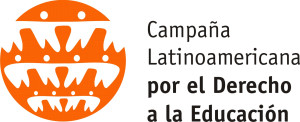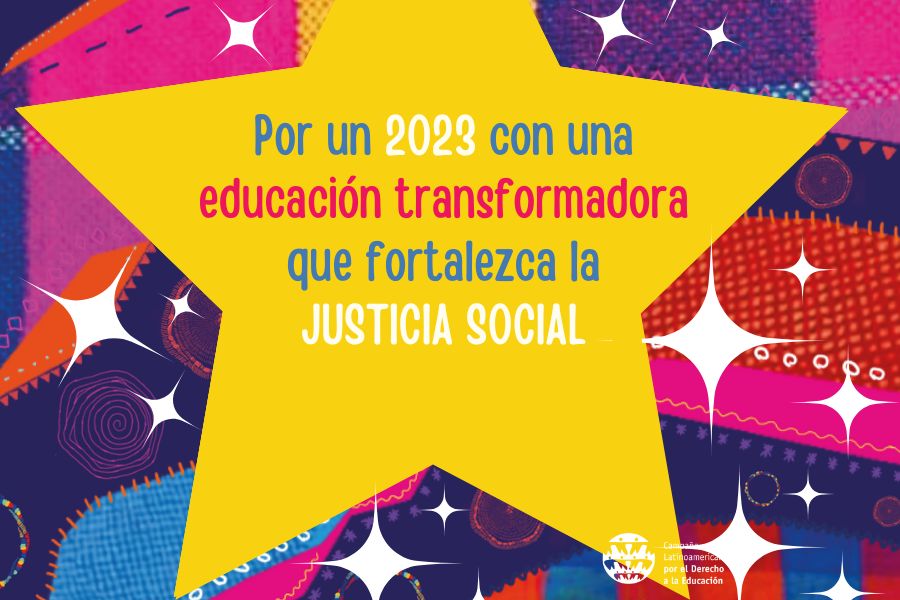
Happy Holidays! For a 2023 with a transformative public education
December 22, 2022Throughout this year we walked together to strengthen the human rights to education in Latin America and the Caribbean.
There were many issues and actions developed by our network.
This 2023 from CLADE we hope to share with more strength and union the path towards social justice from a public education which has care and transformation as its pillars.
Happy Holidays!

Youth and Adults Education Week will be held from March 22 to 27
March 16, 2021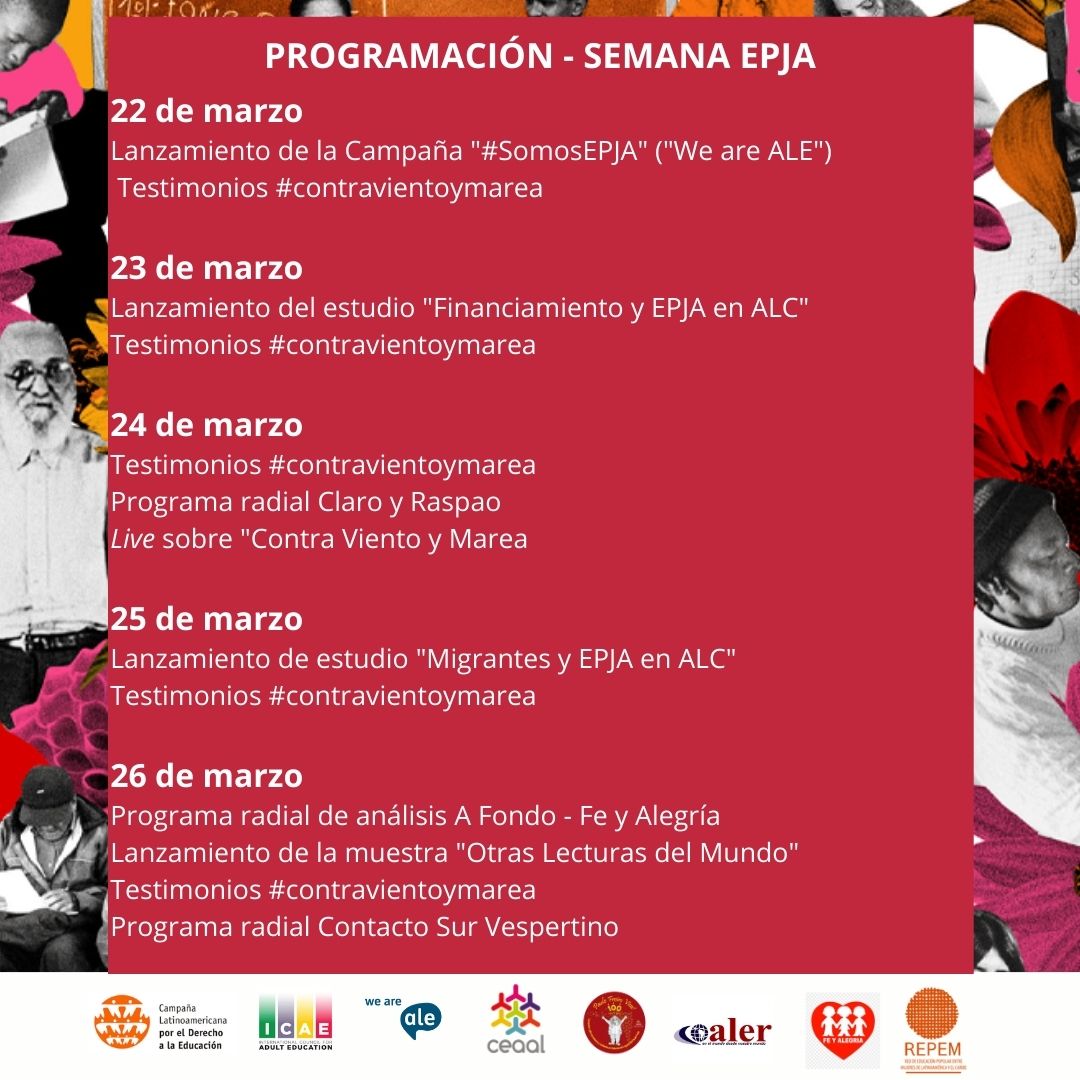
Stories of students and educators about Youth and Adult Education (ALE), artistic works, live and launching of reports are some of the activities of the Young People and Adults Education Week (ALE Week), which will take place from March 22 to 27.
The initiative is organized by CLADE, in partnership with ICAE, CEAAL, ALER, Fe y Alegría and REPEM, and is carried out within the framework of the Latin American and Caribbean Campaign in Defense of Paulo Freire’s Legacy and the We are ALE Campaign.
See below the activities of the week:
#WeAreALE
On March 22, civil society organizations and networks from around the world will launch the Global Campaign “We are ALE”, aimed at advancing and promoting the concept and practice of youth and adult learning and education (ALE).
The idea of the initiative is to bring together civil society organizations to adopt a shared global definition of ALE. Practitioners, students and civil society representatives from five continents will speak with one voice proclaiming: we are ALE!
The opening event, a webinar on March 22 from 10 a.m. (Brazil time), will be the start of a five-year global campaign to raise the visibility of adult learning and education around the world, and to stimulate civil society to speak with one voice to promote the rights of all young people and adults to quality and lifelong education.
Registration for the March 22nd event
Studies on ALE: financing and migration
March 23 and 25 are the days dedicated to the launching of two studies on Youth and Adult Education, elaborated by CLADE with the support of DVV International. The first report to be launched on March 23rd highlights some of the main features of the financing of ALE in Latin America and the Caribbean, in preparation for the next International Conference on Adult Education (CONFINTEA VII) to be held in 2021; and the other, to be launched on March 25th, presents the situation and challenges of ALE and migration in the region.
The studies will be available on the CLADE website.
Live #ContraVientoyMarea
On Wednesday (24/3), at 4 pm (Brazilian time), it will be the time to talk about the Campaign “Against Wind and Tide” (Contra Viento y Marea, in Spanish). The initiative broadcasts educational and communicative radio testimonies from inspiring experiences of teachers and students of ALE in Peru, Ecuador, Colombia and Venezuela in the context of the pandemic.
It has 20 educational and communicative productions that relate experiences, fears and joys of being able to study beyond the difficulties in different countries of the region.
The purpose of this project is to value the ALE and contribute to educational inclusion in Latin America and the Caribbean. The live will be done through CLADE’s Instagram: @red.clade
In addition, during the Week (March 22-26), every day some of the radio testimonies of #ContraVientoyMarea will be broadcasted through CLADE’s social media (FB, TW and Instagram) and the channels of other regional networks allied in the initiative of the Week.
Learn more about #ContraVientoyMarea
Radio program “Claro y Raspao”
On March 24, at 17:00 (Brazilian time), the radio program “Claro y Raspao” will be presented as a space of opinion and information broadcast through the 22 stations that are part of the Fe y Alegria radio network and that will talk about the ALE.
Art and multimedia exhibition “Other Readings of the World: Perspectives of Youth and Adults”
On March 26, it will be the time to know the works registered in the multimedia exhibition “Other readings of the world”. The call for participation in the exhibition was launched on September 8, 2020 in the framework of the celebration of the International Literacy Day, seeking to provide a space for the presentation of experiences that are developed in this field of education and that highlight, through artistic expressions, the importance of ALE as a fundamental human right, its transformative potential and for the promotion of human rights and a dignified life.
On March 26, starting at 11:00 a.m. (Brazilian time), a virtual event will launch the website of the multimedia exhibition, where all the works submitted for the initiative will be presented, from different countries and experiences of ALE in Latin America and the Caribbean, in various formats: photos, documentaries, songs, videos, etc.
The launching, which will have the participation of the people registered to the exhibition, will have artistic exhibitions, and will be transmitted live through CLADE’s Facebook (@redclade) and Youtube (@clade).
>> Registration is now opened here.
Radio programs
A few hours before the launching of the “Other Readings of the World” Exhibition, at 9:00 a.m. (Brazilian time), a radio program of analysis of the current ALE situation will be presented with the participation of the audience and experts in this field of education. This program will have broadcast by the 22 radio stations that make up the Fe y Alegria radio network.
On the same day (March 26), at 18:00 (Brazilian time), it will be presented the radio program Contacto Sur Vespertino, a continental news program produced by ALER’s Continental Information Network (RIC), that is present in 19 countries in Latin America and the Caribbean.
Colombian ALE experiences
On March 27th, starting at 9:00 a.m. (Colombia time), the Colombian Coalition for the Right to Education (CCDE) will present a live about ALE experiences from 6 regions of Colombia. In the event, participants of the experiences will tell about the violations and challenges they have had to face in the struggle for ALE as a human right in the context of the pandemic.
Access link through the Meet platform: https://meet.google.com/pjv-ksrm-ben
The event will be broadcasted through CCDE’s Facebook.
Translated with www.DeepL.com/Translator (free version)

ASPBAE Statement of Solidarity with members and people of Myanmar
February 12, 2021The Asia South Pacific Association for Basic and Adult Education (ASPBAE) stands in solidarity with its members in Myanmar, the Thinking Classroom Foundation and Equality Myanmar, in their resistance to and condemnation of the coup d’etat staged by the Myanmar military on 1 February 2021 which deposed the country’s democratically-elected leaders and subjected the country into a year-long state of emergency in flagrant disrespect of democratic
processes.
The coup averted the convening of the newly-elected Parliament which would have had a stronger presence of the National League for Democracy (NLD). The NLD won a landslide victory in the November 2020 elections, which the military claimed was marred by widespread fraud despite the country’s independent election commission having certified the results and international election observers having deemed the process to have been free and fair.
This brazen act of disregard for democratic principles and human rights by the Myanmar military breaks the tenuous transition to civilian rule started in 2011, after decades of an authoritarian military rule. It also comes at an already difficult time for people in the country reeling under the unprecedented adverse impacts of the COVID-19 pandemic on their health, income, access to food, jobs and over-all well-being.
President Win Myint, State Counsellor Aung San Suu Kyi and hundreds of other political leaders, activists, students and journalists have since been arrested and deprived of their civil liberties. Strategic means of communications were shut down. A number of development workers were also cut off from their organizational headquarters outside the country, sowing an overall feeling of insecurity despite the critical role they play in supporting the country.
In the days following the military coup however, civilian protests and resistance emerged – a sign of hope and affirmation that the people of Myanmar are defying illegitimate military rule. Teachers and labour unions, youth and student groups organized peaceful demonstrations and many have participated in acts of civil disobedience. Civil servants walked out of their work, people in their homes banged pots and pans as a sign of protest, and citizens organised online resistance to the coup – urging everyone, within and outside the country to resist the military regime and defend democracy and human rights at all costs.
We in ASPBAE stand by our civil society members and partners in the country in their fight for democracy and human rights. As a regional network of more than 200 civil society organisations and individuals operating in around 30 countries of the Asia-Pacific, ASPBAE’s core beliefs are founded on the sanctity of human rights and democratic freedoms of the people. Further, through their right to transformative and liberating education and lifelong learning, the people should be empowered with the essential means to combat poverty, fight all forms of discrimination and
authoritarianism, build a culture of peace and enable them to actively participate in development and governance.
We therefore call on our members, partners and the international community to use their voices and influence to:
1. Stand in solidarity with the people of Myanmar and support all forms of solidarity actions that amplify the calls to restore democracy, human rights and people’s well- being in the country.
2. Pressure the Myanmar military to end its unlawful seizure of power and immediately restore democracy and civilian rule in the country by upholding the results of November 2020 elections
3. Demand the immediate release of all detained leaders, activists, students and journalists by dropping all false charges against them and restore their civil liberties
4. Resist any effort by the military to impede or prevent the flow of support services delivered by local, national and international organisations especially to the most marginalised sectors – women and girls, children, ethnic minority groups, people with disabilities, those from the poor communities, the people affected by protracted civil wars in the various parts of the country, and those who continue to suffer from the impact of COVID-19 pandemic
5. Support and stand united with teachers and students who continue to join the efforts of the people and grassroots organisations in conducting various forms of resistance to challenge the military takeover of power ASPBAE is committed to advancing democratic freedoms and human rights for all.
May courage and solidarity sustain the people of Myanmar and all who fight for the restoration of democracy.
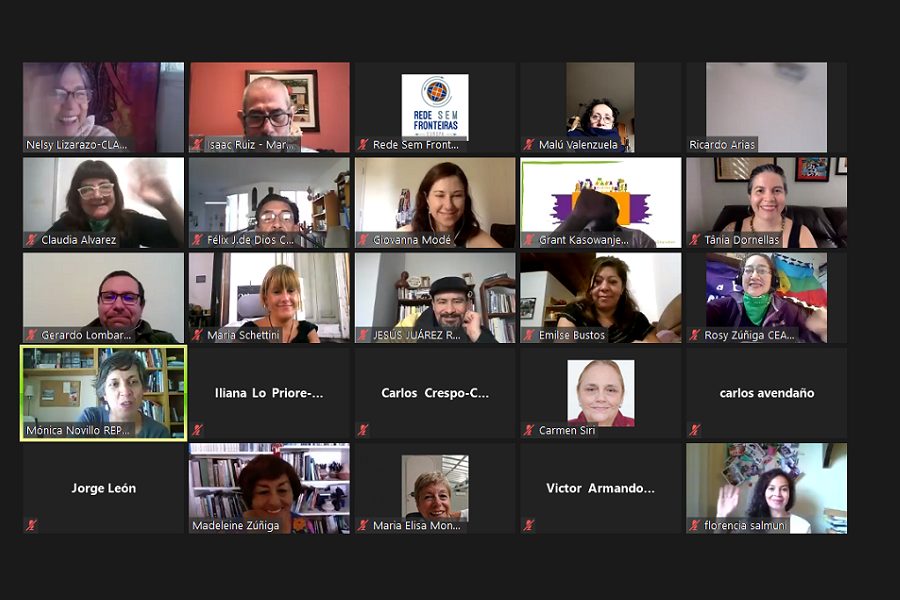
The Assembly “Towards a global agenda: the human right to education from the movements” took place at the World Social Forum 2021.
February 1, 2021With the participation of a hundred delegates from organizations that converge around education as a human right, the self-organized assembly “Towards a global agenda: the human right to education from the movements” was held this Saturday (30) in the framework of the World Social Forum (WSF) 2021.
The activity was organized by the Latin American Campaign for the Right to Education (CLADE), the Council for Popular Education in Latin America and the Caribbean (CEAAL), the Pressenza Agency, the Espacio sin Fronteras Network, the Global March against Child Labour, the Global/Local Network for Quality Education, the Popular Education Network of Women (REPEM), the World Organization for Early Childhood Education (Omep) and Fe y Alegría.
Opening the dialogue, Grant Kasowanjete, Global Coordinator of the Global Campaign for Education, highlighted the need to ensure increased funding for public education in the countries of the global South as one of the main challenges to realizing the human right to education.
She pointed out that “for every dollar of aid that arrives from the global North, ten dollars are taken away through foreign debt and other mechanisms”, which erodes public coffers and underfunds the system, since 90% of education budgets come from own resources.
Nelsy Lizarazo, from the general coordination of CLADE, emphasized the deepening as result of the pandemic, of pre-existing inequality gaps and a refinement of stratification and exclusion from the educational pathway in social sectors lacking support, connectivity or adequate equipment, highlighting rural populations, migrants, indigenous people and people with disabilities, among others.
At the same time, she indicated how governments have handed over millions of dollars and data to corporations, information that will feed the already enormous business of these technology multinationals. She also added that the emergency has meant a greater precariousness of the teaching condition with budget reductions, salary reductions, a heavier workload, to which is added the psychological pressure produced by the effort of educators to respond to and overcome the difficulties posed by the technological and pedagogical challenge of distance education.
On the basis of these characterizations, the question of the learning, strengths and challenges identified in this course was launched as a trigger.
In a first round of interventions, key aspects such as the lack of infrastructure and the need for community technological development independent of large corporate platforms, the damage caused by the exclusion of millions of children from the educational process or the dysfunctionality of homogeneous educational planning in the face of the complexity of diverse realities were pointed out.
Among the lessons learned, the imaginative capacity of the educators who managed to overcome adverse conditions, the propensity for knowledge of children beyond the institutional framework, the importance of dialogue and joint work between school, parents and community, the role of community education together with the favorable impact of progressive political projects in the face of the failure of the neoliberal system were valued.
The assembly continued its collective reflection on the priority agenda of the regions and what is common to these agendas.
In a fluid and propositional dialogue, the participants indicated that the struggle must lead first and foremost, in the face of the prevailing violence in different territories, to guaranteeing the right to life. Likewise, to overcome inequality at educational levels within the social system, to offer safe educational spaces, free of aggression and abuse for girls and boys, and to strengthen a new non-predatory social relationship.
The need to promote a political-pedagogical revolution in the face of neoliberal agendas was also pointed out, as well as the need to strengthen intergenerational dialogue, especially in relation to older adults and the importance of implementing Comprehensive Sex Education as a mechanism to overcome sexual violence against girls, adolescents and women in general.
On the other hand, global priorities included the struggle to ensure that the right to education is not minimized, the defense and strengthening of the public system and counteracting the fallacy that private systems are better, overcoming inequality and discrimination in education, and guaranteeing adequate funding for education from a human rights perspective.
When analyzing possible cross-cutting themes for common action, the indivisibility of human rights was emphasized and, consequently, it was proposed to promote broad alliances by interweaving struggles with the agendas of other rights while contributing to strengthening social organization and mobilization. The importance of continuing to generate knowledge by connecting it with messages and campaigns that mobilise demands was highlighted.
In the same way, a suggestion was made in the debate for a greater exchange on the modalities used to make good practices visible and to achieve effective impact in relation to the demands put forward.
Among the proposals for joint action, the creation of an observatory, the promotion of liberating education in the presence of Paulo Freire’s centenary, the opening of spaces for the expression of the new generations and the idea of Good Living were suggested. Political action is needed to rethink education in terms of feminism and socio-economic equity, and to articulate the forces to overcome not only the physical but also the mental illness from which humanity suffers.
Finally, the Assembly approved a text to be proposed and included in the final declaration of the World Social Forum 2021.
“In the framework of this WSF 2021, we join the agenda of transformation at the global level, articulated to the various fields of social struggle and rights, recognizing the catalytic role of education. The pandemic highlighted the historical inequalities within and outside education systems, affecting women, girls, people with disabilities, refugees and migrants, indigenous communities, rural populations, among others. It also highlighted the digital divide and government responses to it, as well as the need to build a digital sovereignty strategy.
Through strengthened public education systems, it is necessary to resist the threats of fiscal austerity policies, national indebtedness and cuts in education funding, as well as the multiple trends of privatization. From early childhood through to youth and guaranteeing adult education, it is essential, in the post-pandemic period, to rethink the meaning and purpose of education, in the search for the rights of peoples and overcoming patriarchy. A heterogeneous and intercultural model, transformative and inclusive; based on dialogue and safe for communities; valuing their knowledge and local knowledge, as well as collaboration in solidarity and commitment to the protection of life”.
Video:
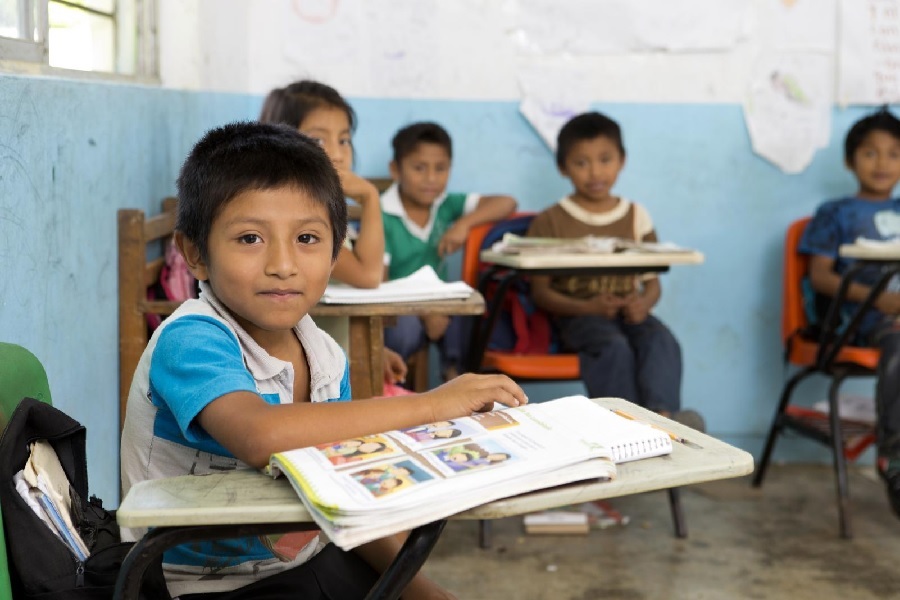
CLADE and CLACSO are promoting a webinar on the Right to Education from a Global South perspective
September 15, 2020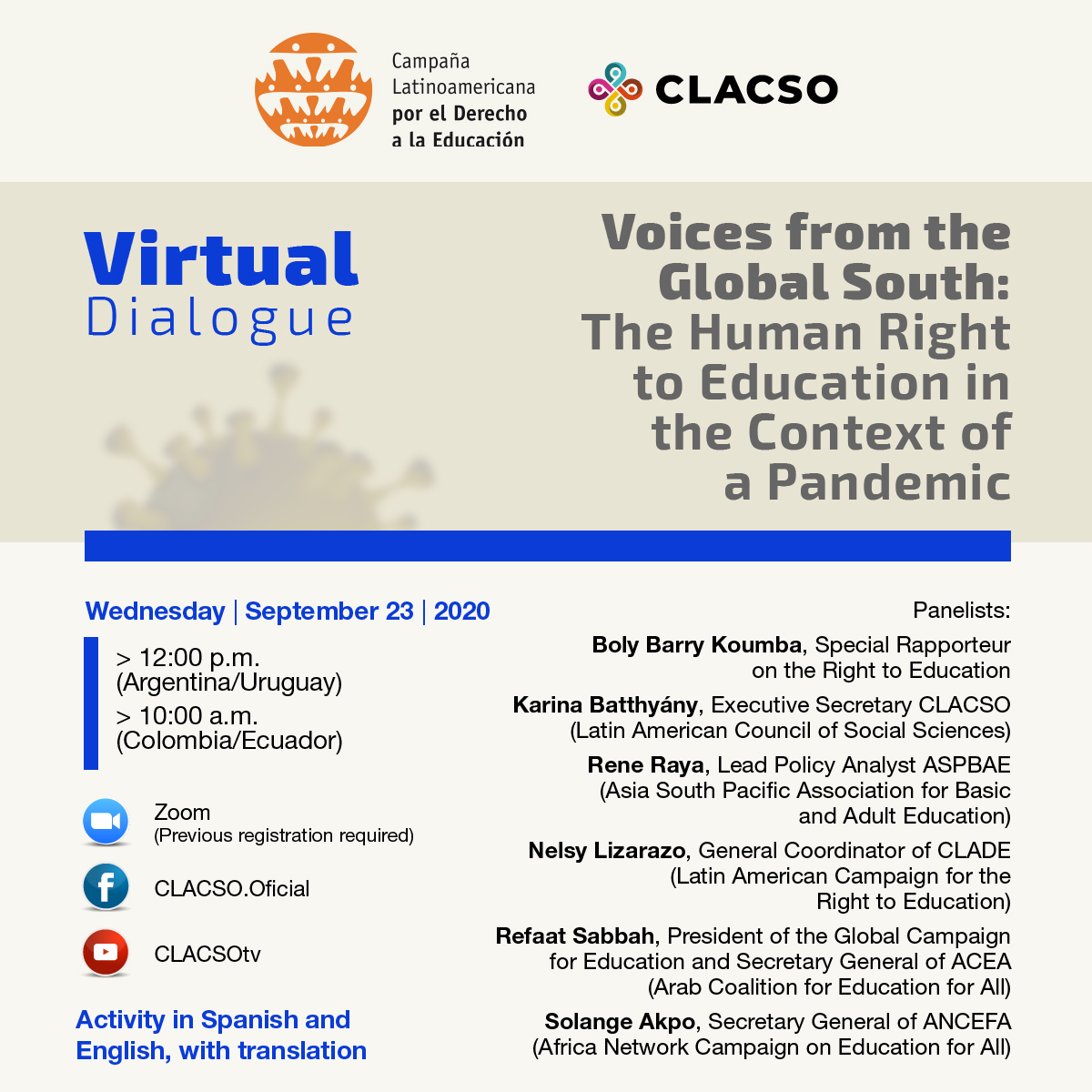 On September 23, at 12:00 p.m. (GMT-3), the Latin American Campaign for the Right to Education (CLADE, by its Spanish acronym) and the Latin American Council of Social Sciences (CLACSO, by its Spanish acronym) will organize a virtual dialogue “Voices from the Global South: The Human Right to Education in the Context of a Pandemic.”
On September 23, at 12:00 p.m. (GMT-3), the Latin American Campaign for the Right to Education (CLADE, by its Spanish acronym) and the Latin American Council of Social Sciences (CLACSO, by its Spanish acronym) will organize a virtual dialogue “Voices from the Global South: The Human Right to Education in the Context of a Pandemic.”
The objective of this gathering is to analyze, reflect and debate on the human right to education in the context of a pandemic, and from a Global South perspective. United Nations (UN) Special Rapporteur for the Right to Education, Boly Barry Koumba will participate in this event. Joining the Special Rapporteur will be CLACSO Executive Secretary, Karina Batthyány; CLADE General Coordinator, Nelsy Lizarazo; the President of the Global Campaign for Education (GCE) and Secretary General of the Arab Coalition for Education for All, Refaat Sabbah; the Lead Policy Analyst of the Asian South Pacific Association for Basic and Adult Education (ASPBAE), Rene Raya; and the Secretary General of the African Network Campaign on Education for All (ANCEFA), Solange Akpo.
The activity is open, free and will be broadcasted through CLACSO Facebook page, Youtube and Zoom. The webinar will be conducted with Spanish-English simultaneous translation. Previous registration here is required for Zoom participation.
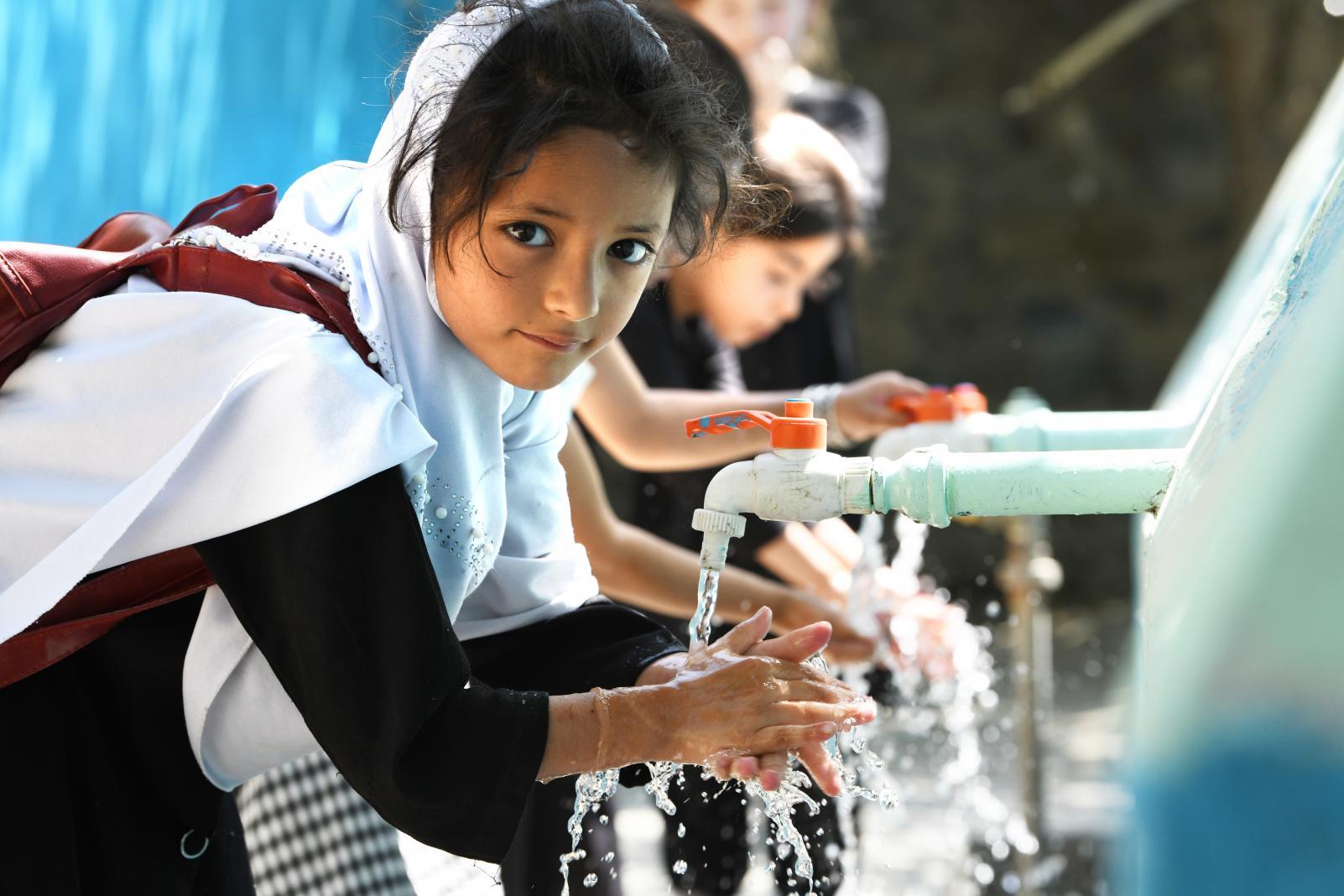
COVID-19: CLADE considers that solidarity and adequate funding for the rights to education, health, and social protection are key to overcome the crisis
March 25, 2020Considering the widespread crisis and state of emergency across the world due to the COVID-19 pandemia, CLADE acknowledges and appreciates the life and health prevention and care recommendations made by the World Health Organization. We would like to express our solidarity with families that have lost their loved ones due to the virus, as well as survivors and sick people. Likewise, we would like to congratulate CLADE members, as well as so many human rights organizations and movements across Latin America and the Caribbean, for promoting several initiatives to ensure the protection of education communities and their human rights. We would like to express our heartfelt thanks to health workers, as well as workers in other key areas who put their lives at risk to provide essential services. (more…)
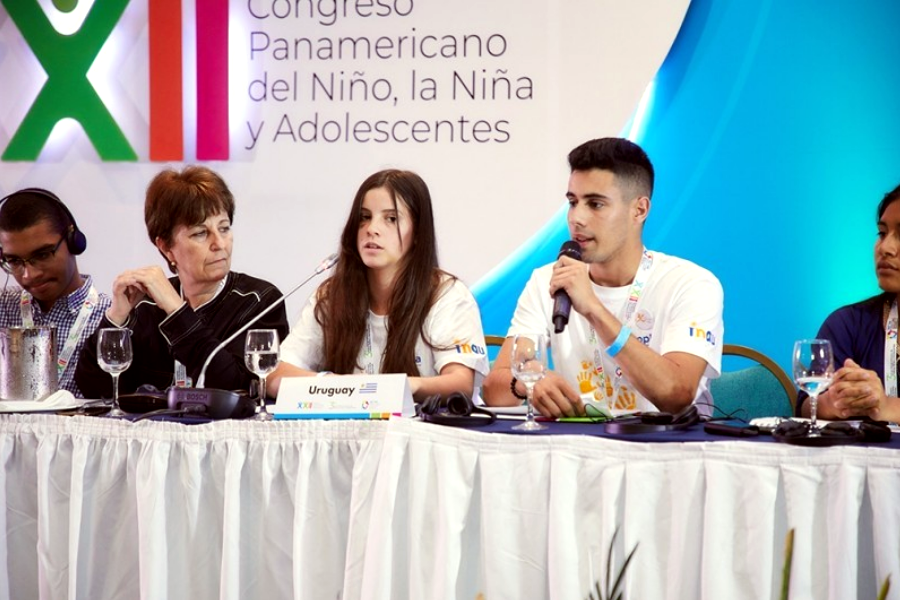
What are Latin America and Caribbean students’ thoughts on education and other human rights?
November 11, 2019Overcoming discrimination and violence, the right to play, art and recreation, gender equality and the right to comprehensive sexuality education and to participate in the debates on public policies affecting them: these were some of the demands shared by boys, girls, adolescents and youths during the 22nd Pan-American Child Congress and the Third Pan-American Child Forum that were held from Oct. 29-31 in Cartagena (Colombia).
(more…)
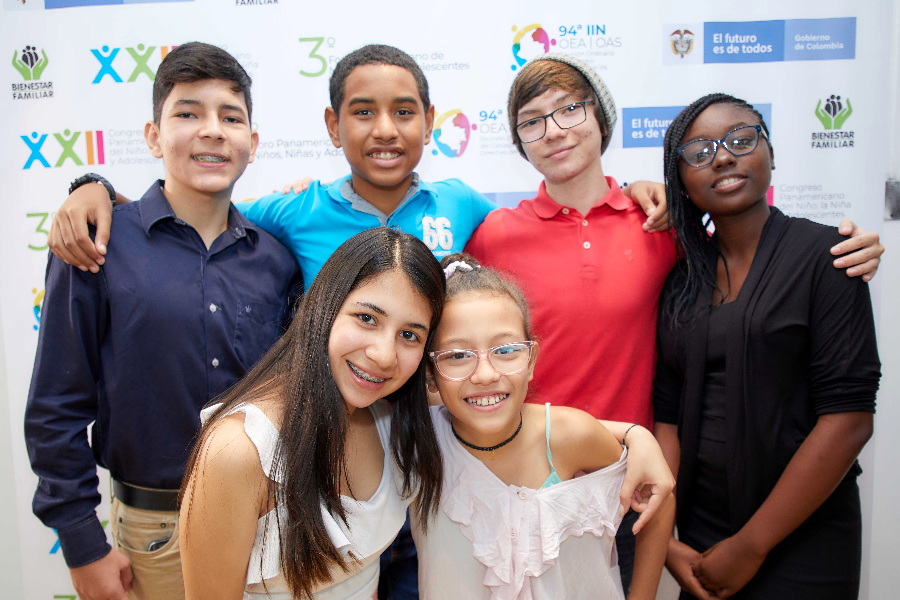
“The Convention is a moral universal instrument against injustice to which girls and boys in the world were subjected”
November 7, 2019Close to the 30th anniversary of the Convention on the Rights of the Child (CRC) to be celebrated on November 20, the president of the Committee on the Rights of the Child, which is responsible for monitoring this treaty, Luis Ernesto Pedernera; and the rapporteur on the rights of the child and president of the Inter-American Commission on Human Rights (CIDH), Esmeralda Arosemena de Troitiño, presented some thoughts on the advances and challenges for the implementation of the Convention.
(more…)
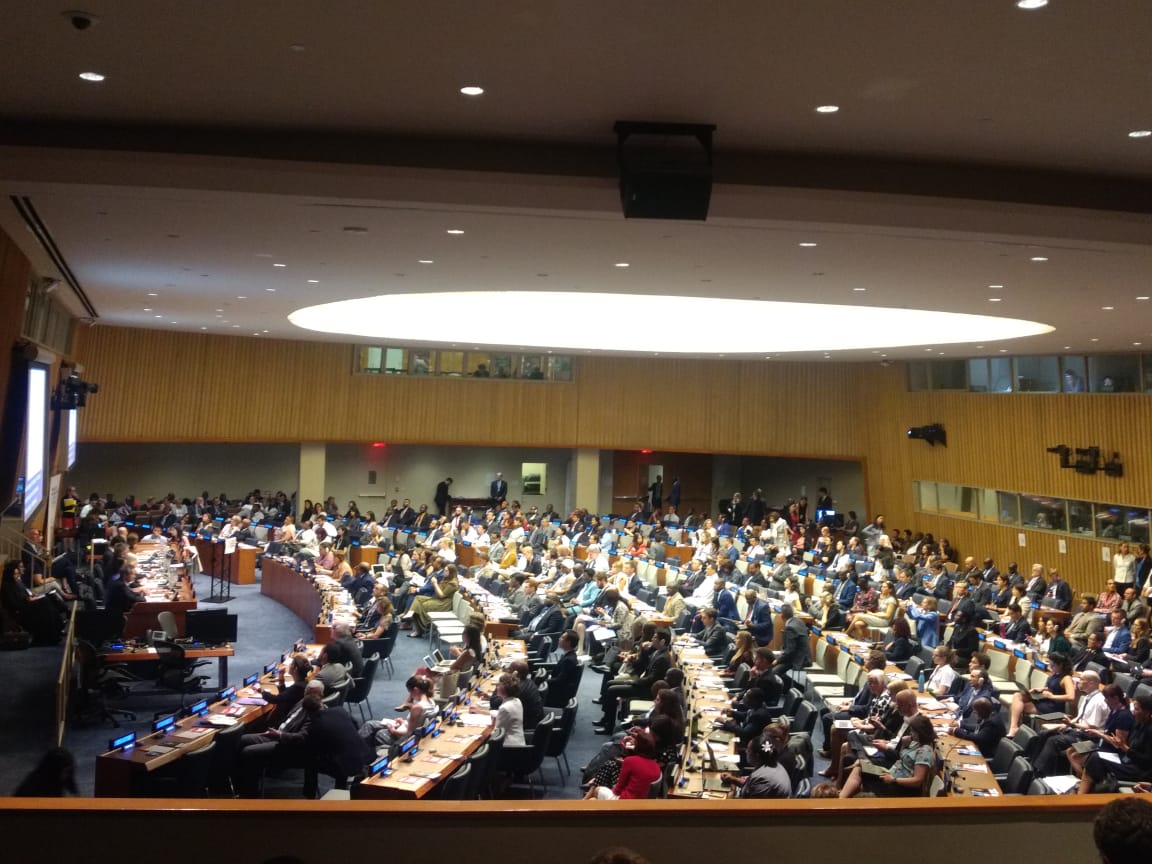
SDG 4 Review of Chile and Guatemala at the UN
July 17, 2019At the UN High-Level Political Forum, the platform to follow up SDGs across the world, Chile and Guatemala presented their voluntary national reviews about the implementation of this agenda. Four countries from Latin America and the Caribbean volunteered to participate in the 2019 review, reporting the actions taken for the achievement of the SDGs: Chile, Guatemala, Brazil and El Salvador. However, on the eve of the High-Level Political Forum, the last two countries announced that they would not participate in the review.
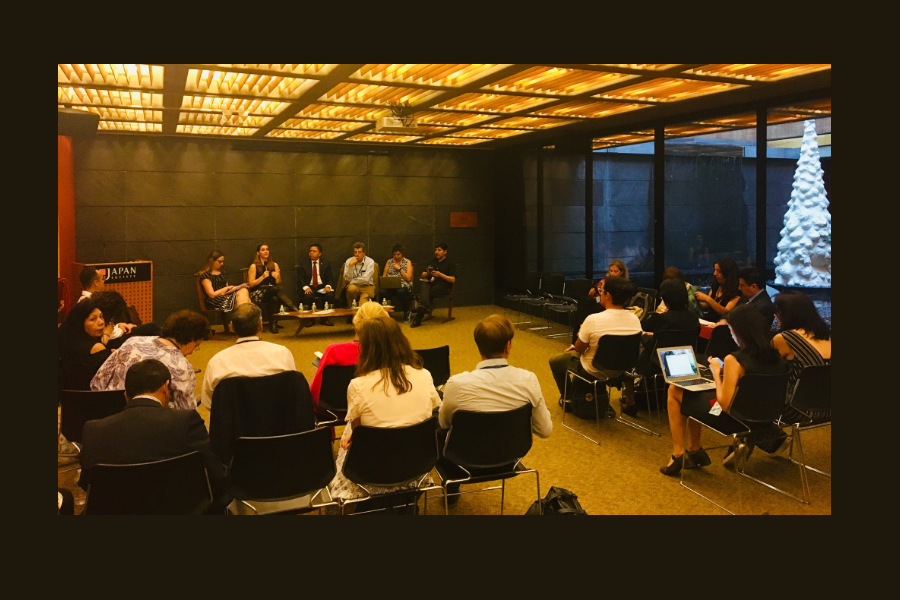
Side event during the UN Forum: “We must educate for citizenship and democracy”
July 11, 2019“One of the main challenges is to guarantee educational quality and, for that, reflect on what kind of quality we want, towards the guarantee of an education that trains people for global citizenship and the strengthening of democracy.” This was one of the reflections that were shared during the high-level discussion “Human rights at risk: impacts for education in Latin America and the Caribbean.” The meeting was held yesterday (July 10) in New York, in the context of the UN High-Level Political Forum, and as an initiative of the Latin American Campaign for the Right to Education (CLADE).
The participants in the opening table of the event were: Héctor Alejandro Canto Mejía, Deputy Minister of Education of Guatemala; Naiara Costa, from the Division of the SDGs (Sustainable Development Goals), Department of Economic and Social Affairs of the United Nations (UN / DESA); Roberto Bissio, from Social Watch; and Camilla Croso, general coordinator of CLADE.
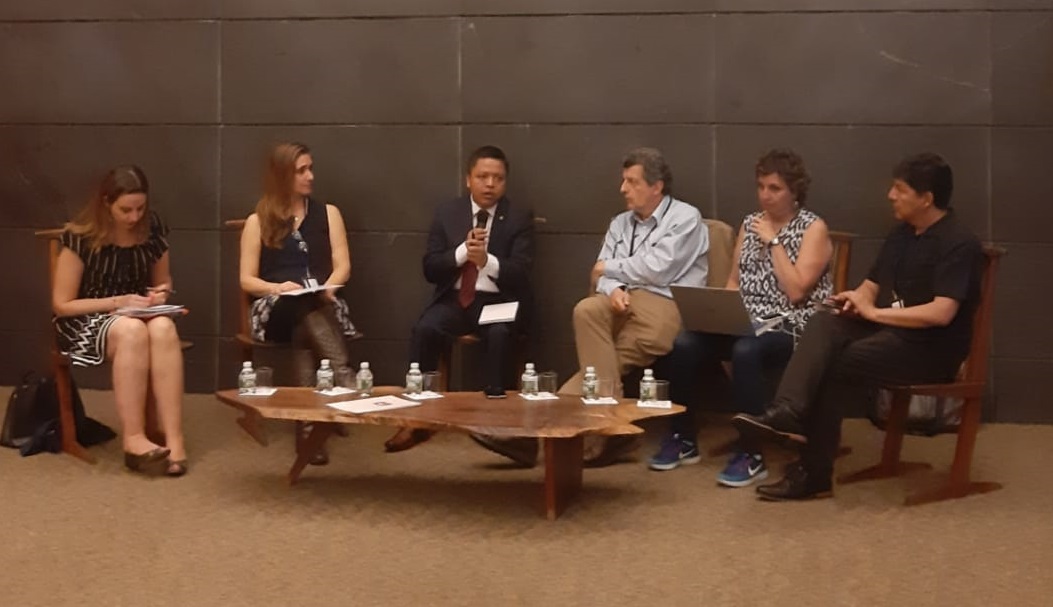
During the discussion, the challenges of education in the region were addressed, in a context of setbacks for human rights and multilateralism, as well as of fragility of democracies. Cultural diversity; school coverage in primary and secondary school; teacher training; migration; respect for diversity and gender equality in education; educational financing; the increased privatization, while public systems are stigmatized; and the challenge of guaranteeing a quality lifelong education for all, were topics highlighted in the presentations.
“All human rights are at risk when we do not comply with the human right to education,” said Camilla Croso at the opening of the conversation.
Next, the Deputy Minister of Education of Guatemala, pointed out some challenges for the realization of the human right to education in his country. “The main challenges are guaranteeing coverage and, in parallel, advancing the rate of completion, transition from primary to secondary school, quality and equity in the education system,” he said.
He added as another challenge the guarantee of quality lifelong education for all. “An education that provides training for global citizenship and democracy.”
Roberto Bissio emphasized the importance of ensuring human rights and protecting the people who defend these rights beyond the achievement of the Sustainable Development Goals. “The central question is to what extent the SDGs legitimize the struggle for rights. We can not forget that in Latin America and the Caribbean human rights defenders are at constant risk,” he said.
Naiara Costa addressed the role of the United Nations and multilateralism for the realization of human rights and the promotion of sustainable development. “To achieve the SDGs, it is essential to connect the global level with the local, national and regional levels”, he said.
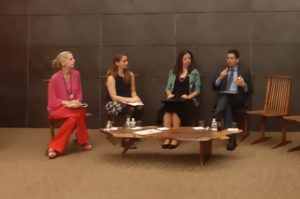
Debate
Representatives from the following organizations: Argentine Campaign for the Right to Education; Bolivian Campaign for the Right to Education; Campanha Nacional pelo Direito à Educação – Brazil; Forum for the Right to Public Education in Chile; Salvadoran Network for the Right to Education; Collective of Education for All of Guatemala; Forum Honduras Honduras; Peruvian Campaign for the Right to Education (CPDE); Socio-educational Forum (Foro Socioeducativo), of the Dominican Republic; Popular Education Network among Women of Latin America and the Caribbean (REPEM); ILGALAC (International Lesbian, Gay, Bisexual, Trans and Intersex Association for Latin America and the Caribbean); Global Campaign for Education; ActionAid International; and EDUCO, among other organizations and networks, participated in the debate.
Vernor Muñoz, from Global Campaign for Education, recalled, as an obstacle to education and other human rights, the criminalization of social protest, especially of students and teachers in different countries of Latin America and the Caribbean, which also operates in the symbolic field and in the media.
Roberto Baeza, from ILGALAC, spoke about comprehensive sexual education and school violence against LGBTI people. “Gaps in inequality in education and other sectors are widened with the advance of fundamentalisms. The trans population does not have access to their right to education, they are who most leave the school because of experiences of discrimination,” he said.
Marcela Browne, from the Argentine Campaign for the Right to Education, said that in the debate on the fulfillment of the right to education, it is necessary to ask: “What are the risks of external debt and tax fraud for educational justice in the region?
New document
During the event, CLADE launched the publication “Civil Society Advocacy for the Human Right to Education: Stories and Lessons Learned from Latin America and the Caribbean – Volume 3”.
Read more and download the document here
CLADE at the UN High-Level Political Forum
Almost four years after the adoption of Sustainable Development Goal 4 (SDG 4), about education, the United Nations High-Level Political Forum (HLPF) 2019, official platform for monitoring the Sustainable Development Goals (ODS) internationally, took place from 9 to 18 July in New York.
In this edition, the HLPF focuses on the revision of SDG 4, as well as goals 8 (decent work and economic growth), 10 (reduction of inequalities), 13 (climate action), 16 (peace, justice and solid institutions) and 17 (partnerships to achieve the objectives).
CLADE participated in the HLPF and its side events with a delegation of 14 people from 9 countries: Argentina, Bolivia, Brazil, Chile, El Salvador, Guatemala, Honduras, Peru and the Dominican Republic.
CLADE members in the countries that were reviewed by the UN this year (Guatemala and Chile) prepared reports with contributions on the status of SDG 4 at national level. In addition, CLADE members from Brazil and El Salvador prepared reports, highlighting the challenges of education in their territories, since these countries had indicated that they would participate in the review process carried out by the UN, but finally this did not happened.





